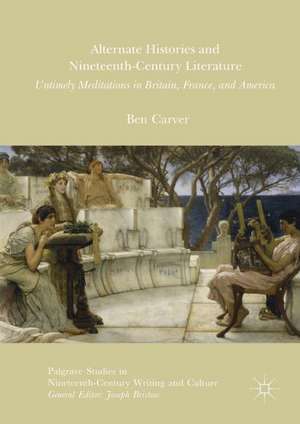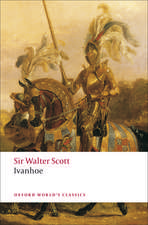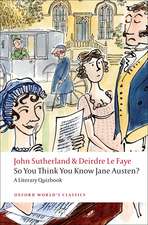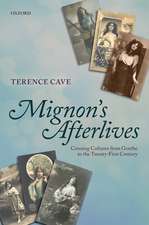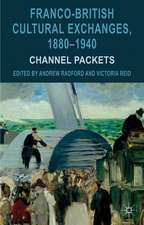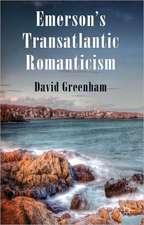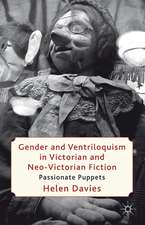Alternate Histories and Nineteenth-Century Literature: Untimely Meditations in Britain, France, and America: Palgrave Studies in Nineteenth-Century Writing and Culture
Autor Ben Carveren Limba Engleză Hardback – 27 oct 2017
Din seria Palgrave Studies in Nineteenth-Century Writing and Culture
- 15%
 Preț: 584.43 lei
Preț: 584.43 lei - 9%
 Preț: 695.72 lei
Preț: 695.72 lei - 20%
 Preț: 691.58 lei
Preț: 691.58 lei - 15%
 Preț: 646.30 lei
Preț: 646.30 lei - 15%
 Preț: 526.18 lei
Preț: 526.18 lei -
 Preț: 389.11 lei
Preț: 389.11 lei -
 Preț: 384.70 lei
Preț: 384.70 lei -
 Preț: 390.63 lei
Preț: 390.63 lei -
 Preț: 390.63 lei
Preț: 390.63 lei -
 Preț: 390.63 lei
Preț: 390.63 lei -
 Preț: 388.72 lei
Preț: 388.72 lei -
 Preț: 388.72 lei
Preț: 388.72 lei -
 Preț: 390.63 lei
Preț: 390.63 lei -
 Preț: 389.31 lei
Preț: 389.31 lei -
 Preț: 388.72 lei
Preț: 388.72 lei - 15%
 Preț: 700.75 lei
Preț: 700.75 lei - 18%
 Preț: 731.10 lei
Preț: 731.10 lei -
 Preț: 387.75 lei
Preț: 387.75 lei - 15%
 Preț: 651.51 lei
Preț: 651.51 lei -
 Preț: 390.63 lei
Preț: 390.63 lei -
 Preț: 386.81 lei
Preț: 386.81 lei -
 Preț: 390.63 lei
Preț: 390.63 lei -
 Preț: 388.72 lei
Preț: 388.72 lei -
 Preț: 389.11 lei
Preț: 389.11 lei -
 Preț: 389.88 lei
Preț: 389.88 lei - 15%
 Preț: 641.71 lei
Preț: 641.71 lei -
 Preț: 386.61 lei
Preț: 386.61 lei - 15%
 Preț: 584.43 lei
Preț: 584.43 lei -
 Preț: 392.60 lei
Preț: 392.60 lei -
 Preț: 390.84 lei
Preț: 390.84 lei -
 Preț: 387.75 lei
Preț: 387.75 lei -
 Preț: 392.97 lei
Preț: 392.97 lei - 15%
 Preț: 642.36 lei
Preț: 642.36 lei - 15%
 Preț: 582.80 lei
Preț: 582.80 lei - 15%
 Preț: 639.25 lei
Preț: 639.25 lei -
 Preț: 388.72 lei
Preț: 388.72 lei -
 Preț: 387.20 lei
Preț: 387.20 lei - 15%
 Preț: 642.51 lei
Preț: 642.51 lei -
 Preț: 384.31 lei
Preț: 384.31 lei -
 Preț: 387.75 lei
Preț: 387.75 lei -
 Preț: 389.70 lei
Preț: 389.70 lei
Preț: 644.18 lei
Preț vechi: 757.85 lei
-15% Nou
Puncte Express: 966
Preț estimativ în valută:
123.28€ • 128.23$ • 101.77£
123.28€ • 128.23$ • 101.77£
Carte tipărită la comandă
Livrare economică 15-29 aprilie
Preluare comenzi: 021 569.72.76
Specificații
ISBN-13: 9781137573339
ISBN-10: 1137573333
Pagini: 294
Ilustrații: XVIII, 292 p. 12 illus.
Dimensiuni: 148 x 210 x 28 mm
Greutate: 0.52 kg
Ediția:1st ed. 2017
Editura: Palgrave Macmillan UK
Colecția Palgrave Macmillan
Seria Palgrave Studies in Nineteenth-Century Writing and Culture
Locul publicării:London, United Kingdom
ISBN-10: 1137573333
Pagini: 294
Ilustrații: XVIII, 292 p. 12 illus.
Dimensiuni: 148 x 210 x 28 mm
Greutate: 0.52 kg
Ediția:1st ed. 2017
Editura: Palgrave Macmillan UK
Colecția Palgrave Macmillan
Seria Palgrave Studies in Nineteenth-Century Writing and Culture
Locul publicării:London, United Kingdom
Cuprins
Introduction: Latency and history.- Chapter 1. Napoleonic Imaginaries.- Chapter 2. Inheriting Antiquity: Political Invention in Disraeli and Renouvier.- Chapter 3. Nebulous History and the Plurality of Worlds.- Chapter 4. Lost Worlds and Alternate Histories of Gender.- Chapter 5. Earliness and Lateness: Renewing American Dreams and Nightmares.- Conclusion: Invisible Worlds.
Recenzii
“It communicates a great deal more about the shape and texture of the nineteenth-century intellectual and literary landscape. It is an intelligent and admirably comprehensive study that is sure to find an appreciative audience among scholars in and around the humanities. It will be a special treat for sf fans eager to learn about the complex conditions out of which the genre arose.” (Stephen Dougherty, Science Fiction Studies, Vol. 46, 2019)
Notă biografică
Ben Carver is Associate Lecturer in English at Falmouth University, UK. He was awarded his doctorate from the University of Exeter in 2013 and since then has been teaching and researching nineteenth-century literature and culture. He is now studying the circulation of conspiracy beliefs and narratives, which is part of the COST-funded “Comparative Analysis of Conspiracy Theories” project.
Textul de pe ultima copertă
‘In a stimulating text rich with “alternate facts”, Carver reminds us that history is also what failed to happen and that each historical present carries with it its fantasies of alternate realities. The counterfactual has become a banality today, but this stimulating history of plural virtualities demonstrates how poetic our prosaic 19th century was in fact, and how productively it confronted its own unrealized possibilities.’ — Fredric Jameson, Knut Schmidt-Nielsen Professor of Comparative Literature, Duke University, USA
‘Ben Carver's lucid and insightful book reveals the spread of alternate-history speculation through a surprisingly wide range of nineteenth-century disciplines, genres, and national literatures. Alternate Histories and Nineteenth-Century Literature makes an essential contribution to our understanding of the century's historical imagination.’ — Catherine Gallagher, Eggers Professor of English Literature, Emerita, University of California, Berkeley, USA
'Ben Carver has produced a rich, wide-ranging and imaginative study of a neglected genre that has much to teach us about the nineteenth century and its characteristic modes of narrating the past, present and future. This is, in short, a valuable alternate history of Victorian historiography, as well as an original contribution to our understanding of the utopian imagination.' — Matthew Beaumont, Professor of English Literature, University College London, UK
style="color: rgb(0, 0, 0); font-size: 12px;">This book provides the first thematic survey and analysis of nineteenth-century writing that imagined outcomes that history might have produced. Narratives of possible worlds and scenarios—referred to here as “alternate histories”—proliferated during the nineteenth century and clustered around pressing themes and emergent disciplines of knowledge. This study examines accounts of undefeated Napoleons after Waterloo, alternative genealogiesof western civilization from antiquity to the (nineteenth-century) present day, the imagination of variant histories on other worlds, lost-world fictions that “discovered” improved relations between men and women, and the use of alternate history in America to reconceive the relationship between the New World and the Old. The “untimely” imagination of other histories interrogated the impact of new techniques of knowledge on the nature of history itself. This book sheds light on the history of speculative thought, and the relationship between literature and the history of ideas in the nineteenth century.
‘Ben Carver's lucid and insightful book reveals the spread of alternate-history speculation through a surprisingly wide range of nineteenth-century disciplines, genres, and national literatures. Alternate Histories and Nineteenth-Century Literature makes an essential contribution to our understanding of the century's historical imagination.’ — Catherine Gallagher, Eggers Professor of English Literature, Emerita, University of California, Berkeley, USA
'Ben Carver has produced a rich, wide-ranging and imaginative study of a neglected genre that has much to teach us about the nineteenth century and its characteristic modes of narrating the past, present and future. This is, in short, a valuable alternate history of Victorian historiography, as well as an original contribution to our understanding of the utopian imagination.' — Matthew Beaumont, Professor of English Literature, University College London, UK
style="color: rgb(0, 0, 0); font-size: 12px;">This book provides the first thematic survey and analysis of nineteenth-century writing that imagined outcomes that history might have produced. Narratives of possible worlds and scenarios—referred to here as “alternate histories”—proliferated during the nineteenth century and clustered around pressing themes and emergent disciplines of knowledge. This study examines accounts of undefeated Napoleons after Waterloo, alternative genealogiesof western civilization from antiquity to the (nineteenth-century) present day, the imagination of variant histories on other worlds, lost-world fictions that “discovered” improved relations between men and women, and the use of alternate history in America to reconceive the relationship between the New World and the Old. The “untimely” imagination of other histories interrogated the impact of new techniques of knowledge on the nature of history itself. This book sheds light on the history of speculative thought, and the relationship between literature and the history of ideas in the nineteenth century.
Caracteristici
First book-length scholarly survey of this category in the nineteenth century Makes persuasive links between nineteenth-century scientific culture (in particular evolutionary theory) and speculative literature in the period. Provides a genealogy of a well-known twentieth-century genre (alternate history), which is traced from its European origins to its passage to the US.
